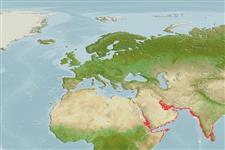>
Eupercaria/misc (Various families in series Eupercaria) >
Nemipteridae (Threadfin breams, Whiptail breams)
Etymology: Scolopsis: Greek, skolex = worm + Greek, opsis = appearance (Ref. 45335).
More on author: Cuvier.
Environment: milieu / climate zone / depth range / distribution range
Ecologia
marinhas associadas(os) a recifes; intervalo de profundidade 20 - 50 m (Ref. 28016). Tropical; 31°N - 5°N, 31°E - 82°E (Ref. 3810)
Western Indian Ocean: Red Sea, Gulf of Aden, Gulf of Oman, Persian Gulf, Arabian Sea and Sri Lanka (Gulf of Mannar). This species has been misidentified as Scolopsides rupellii (=Scolopsis vosmeri) or as Scolopsis phaeops (= Scolopsis frenatus) by some authors.
Comprimento de primeira maturação / Tamanho / Peso / Idade
Maturity: Lm 19.8 range ? - ? cm
Max length : 36.0 cm TL macho/indeterminado; (Ref. 11441); common length : 20.0 cm TL macho/indeterminado; (Ref. 5450)
Espinhos dorsais (total): 10; Raios dorsais (total): 9; Espinhos anais 3; Raios anais : 7. Head scales reaching forward to or just in front of level of anterior margin of eyes. Lower limb of preopercle scaly. Antrorse (forward-directed) suborbital spine absent. Pelvic fins long, reaching to level of anus. Axillary scale absent. Color: Upper body greenish-olive, whitish below. A narrow whitish stripe along base of dorsal fin. Another prominent black dark brown or black streak above lateral line beginning below about the third or fourth dorsal spine and ending on caudal peduncle. A bright blue stripe from eye to upper jaw and from posterior edge of the eye to base of pectoral fin, where it ends in a blue spot.
Commonly found associated with reefs (Ref. 30573).
Ciclo de vida ou comportamento de acasalamento
Maturidade | Reprodução | Desova | Ovos | Fecundidade | Larvas
Russell, B.C., 1990. FAO Species Catalogue. Vol. 12. Nemipterid fishes of the world. (Threadfin breams, whiptail breams, monocle breams, dwarf monocle breams, and coral breams). Family Nemipteridae. An annotated and illustrated catalogue of nemipterid species known to date. FAO Fish. Synop. 125(12):149p. Rome: FAO. (Ref. 3810)
Status na Lista Vermelha da UICN (Ref. 130435)
Ameaça para os humanos
Harmless
Uso pelos humanos
Pescarias: pesca de subsistência
Mais informação
ReferênciasAquaculturaPerfil para aquaculturaEstirpesGenéticaElectrophoresesHereditariedadeDoençasProcessamentoNutrientsConversão de massa
ColaboradoresFotosStamps, Coins Misc.SonsCiguateraVelocidadeTipo de nataçãoÁrea branquialOtólitosCérebrosVisão
Ferramentas
Relatórios especiais
Baixar XML
Fontes da internet
Estimates based on models
Preferred temperature (Ref.
123201): 24.4 - 29.2, mean 26.4 °C (based on 59 cells).
Índice de diversidade filogenética (Ref.
82804): PD
50 = 0.5000 [Uniqueness, from 0.5 = low to 2.0 = high].
Bayesian length-weight: a=0.01622 (0.00730 - 0.03605), b=2.98 (2.80 - 3.16), in cm total length, based on LWR estimates for this Genus-body shape (Ref.
93245).
Nível Trófico (Ref.
69278): 3.7 ±0.5 se; based on size and trophs of closest relatives
Generation time: 1.8 ( na - na) years. Estimated as median ln(3)/K based on 2
growth studies.
Resiliência (Ref.
120179): médio(a), tempo mínimo de duplicação da população 1,4 - 4,4 anos (tm=1.1; Tmax=5; K=1.17).
Fishing Vulnerability (Ref.
59153): Low vulnerability (18 of 100).
Climate Vulnerability (Ref.
125649): Very high vulnerability (87 of 100).
Nutrients (Ref.
124155): Calcium = 66.5 [39.1, 137.1] mg/100g; Iron = 0.825 [0.394, 2.020] mg/100g; Protein = 19.2 [17.3, 20.9] %; Omega3 = 0.147 [0.085, 0.255] g/100g; Selenium = 43 [24, 80] μg/100g; VitaminA = 36.2 [10.1, 110.1] μg/100g; Zinc = 1.29 [0.88, 1.89] mg/100g (wet weight);
